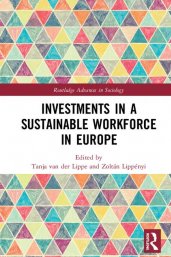Professor Tanja van der Lippe nominated for Huibregtsenprijs
Research into investments in a sustainable workforce

When does an organisation make the decision to invest in an employee? And when do employees make use of schemes such as leave or training? Professor Tanja van der Lippe organised a large-scale European research in which these kinds of questions were central. She has now been nominated for the Huibregtsen Prize of the KNAW.
Van der Lippe is very happy with the nomination, although the competition for the final prize is fierce. “I see it as a big compliment, it shows that achieving a sustainable workforce is recognised as an important issue. A reward for our hard work! Of the other nominees, many come from the life sciences, I don't know what that says about our chances ... But it is very honorable to be nominated and I already receive congratulations. to a recent research project that is scientifically innovative with a clear societal relevance.
Societal relevance of sustainable workforce
With more women on the labour market, more people over 55, more temporary contracts, more influence of technology and more migration, it is an important question how to keep people motivated, healthy and productive at work. The ERC funded research Sustainable Workforce, the results of which happen to appear as a book next week, focusses from 2013 to 2018 on this question. Tanja van der Lippe, professor of sociology at Utrecht University and also connected to the Future of Work hub, initiated and led the research.
Employers want to know: who do I have to invest in, and in what way, to get the best results out of my staff and to keep them happy at work?
Society is looking for answers, according to both the jury of the Huibregtsen Prize and professor Van der Lippe. "Organisations want to know: who do I have to invest in, and in what way, to get the best work from my staff?", says Van der Lippe. Do employees know and use the policies and training offered to them and do they help them succeed and be happy at work? ”
Workforce Sustainability Testing Platform
A major reason why Van der Lippe's research is nominated is the fact that she also makes the results and methodology available to organisations. A Workforce Sustainability Testing Platform (Work-STeP) is being developed together with interested companies. It is an online tool that helps companies to answer questions or concerns about sustainable employability. The driving force behind this is Thomas Martens, impact manager and also closely involved with the Future of Work hub of Utrecht University. He requested a Proof of Concept from the EU and the researchers were granted money to develop the tool. This platform is especially very welcome in small and medium-sized businesses, because they do not have the resources to buy expensive HR analytics programs. And small and medium-sized businesses are a very large group of employers in Europe.
Advantage of international comparison
The Sustainable Workforce survey covers eleven thousand employees in nine European countries: the Netherlands, Germany, Sweden, Finland, England, Bulgaria, Hungary, Portugal and Spain. The researchers conducted surveys among employees, their managers and HR employees in 259 companies.

"This European scale has two advantages," Van der Lippe explains. “We can learn more about the situation in the Netherlands by comparing it with other countries. And secondly, this way of collecting and combining data was never done. There were large data sets available on sustainable employability of employees in countries, but not in combination with companies. Suppose: in a certain profession, temporary work is on the rise. Then there are important questions: is that due to the nature of the work? Or by those specific companies? Or does something else have an impact, such as legislation in a country or the influence of colleagues? Our research has been able to provide answers to that.”
Award ceremony and book
The winner of the Huibregtsen Prize will be announced on 7 October at the Evening of Science and Society in the Ridderzaal in The Hague. The prize consists of a sculpture, a sum of money of 25,000 euros earmarked for scientific research and a workshop offered. The book Investments in a Sustainable Workforce in Europe edited by Tanja van der Lippe en Zoltán Lippényi will be available from 25 June.

